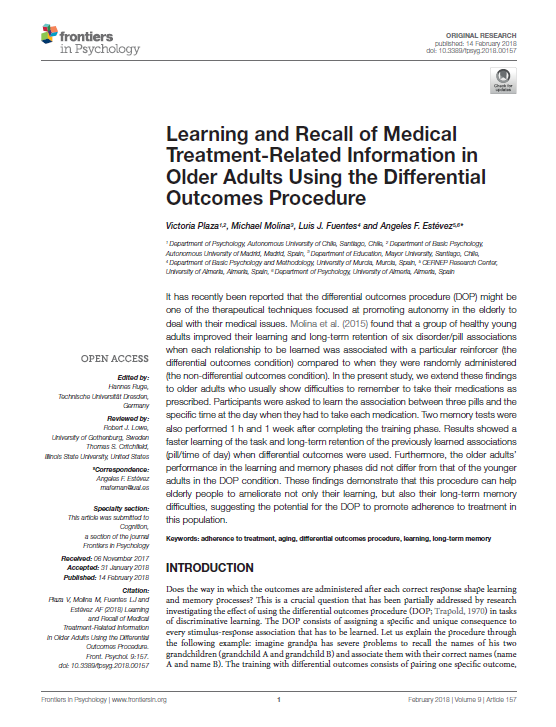Learning and Recall of Medical Treatment-Related Information in Older Adults Using the Differential Outcomes Procedure

Ver / Abrir [Según licencia]
Fecha
2018-02-14Autor
Plaza, Victoria [Chile. Universidad Autónoma de Chile. Departamento de Psicología]
Molina, Michael [Chile. Universidad Mayor. Departamento de Educación]
Fuentes, Luis J. [España. Universidad de Murcia. Departamento de Psicología Básica y Metodología]
Estevez, Angeles F. [España. Universidad de Almería. Centro de Investigación CERNEP]
Ubicación geográfica
Notas
HERRAMIENTAS
Acceda a títulos restringidos
¿Cómo descargar?Resumen
It has recently been reported that the differential outcomes procedure (DOP) might be one of the therapeutical techniques focused at promoting autonomy in the elderly to deal with their medical issues. Molina et al. (2015) found that a group of healthy young adults improved their learning and long-term retention of six disorder/pill associations when each relationship to be learned was associated with a particular reinforcer (the differential outcomes condition) compared to when they were randomly administered (the non-differential outcomes condition). In the present study, we extend these findings to older adults who usually show difficulties to remember to take their medications as prescribed. Participants were asked to learn the association between three pills and the specific time at the day when they had to take each medication. Two memory tests were also performed 1 h and 1 week after completing the training phase. Results showed a faster learning of the task and long-term retention of the previously learned associations (pill/time of day) when differential outcomes were used. Furthermore, the older adults' performance in the learning and memory phases did not differ from that of the younger adults in the DOP condition. These findings demonstrate that this procedure can help elderly people to ameliorate not only their learning, but also their long-term memory difficulties, suggesting the potential for the DOP to promote adherence to treatment in this population.
Coleccion/es a la/s que pertenece:
Si usted es autor(a) de este documento y NO desea que su publicación tenga acceso público en este repositorio, por favor complete el formulario aquí.